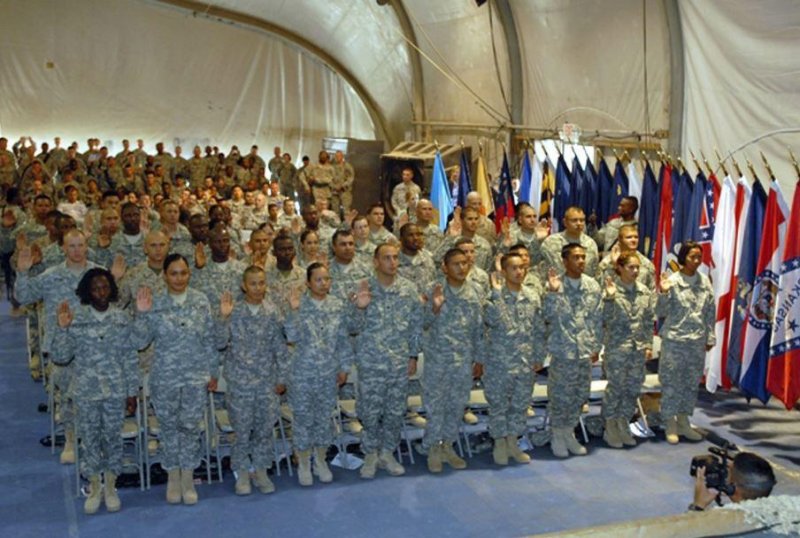U.S. Army and Marines personnel are sworn in as U.S. citizens at Bagram Air Field, Afghanistan, in June. On Tuesday a federal judge struck down minimum service requirements for troops seeking U.S. citizenship. Photo courtesy of U.S. Army
Aug. 26 (UPI) -- A federal judge struck down a Pentagon policy which slows the citizenship path of non-citizens in the U.S. military.
The overturned policy required a potential citizen to serve at least 180 days in active service, or one year as a reservist, to qualify for certification leading to citizenship.
A class action lawsuit filed in April by eight active duty service members, seven long-time permanent U.S. residents and one Deferred Action for Childhood Arrivals, or DACA, plaintiff, contended that the Defense Department's length-of-service requirement was a violation of the Immigration and Nationality Act.
U.S. District Court Judge Ellen Huvelle, in a 62-page ruling on Tuesday, said the law indicates that the military can determine only if an enlistee "served honorably."
"While a fuller military record may be necessary to determine whether someone is suitable to serve in the military, defendants have not explained why it is necessary for eligibility to naturalize," Huvelle wrote in part. "DOD may not, through a time-in-service requirement or an active-duty requirement, convert this determination to a certification of present military suitability or active honorable service."
The case, filed by the American Civil Liberties Union, moved quickly through the District of Columbia District Court. The lead plaintiff was Army Pfc. Ange Samma, formerly of Burkina Faso and currently serving in South Korea.
To begin the naturalization process, service members must receive an N-426 certification of honorable service from the Defense Department, allowing the citizenship process to begin.
The lawsuit charged that security checks and similar actions by the Pentagon blocked their paths to citizenship and caused delays in obtaining security clearances and other requirements needed for careers after military service.
It also alleged that the Defense Department "adopted an unlawful policy of withholding certifications of plaintiffs' honorable service, which they require to apply to naturalize based on their ongoing military service."
"As a result, defendants are denying thousands of men and women in uniform the U.S. citizenship that Congress has long promised to non-citizens serving in our military."
The security checks were instituted in 2017 to protect against infiltration by foreign nationals with ties to terrorism. About 10,400 foreign nationals were recruited between 2008 and 2016 through a program designed to bring in non-citizens with needed language skills and health care or technology proficiency.















